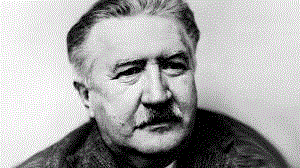Josef Suk (1874-1935) was a prominent Czech composer and violinist, a significant figure in late-Romantic music, and a key representative of Czech national music. As a student of Antonín Dvořák and later his son-in-law, Suk’s compositions reflect a rich blend of Bohemian folk traditions, deep emotion, and innovative musical techniques. His works have gained recognition for their lyricism, complexity, and emotional depth, firmly establishing him as one of the most important composers in Czech musical history.
Early Life and Education
Josef Suk was born on January 4, 1874, in Křečovice, a small village in what is now the Czech Republic. His family had deep roots in music—his father was a village schoolteacher and amateur musician, which likely influenced Suk’s early exposure to the world of music. He began learning the violin and piano at an early age, demonstrating exceptional talent. By the age of 11, Suk entered the Prague Conservatory, where his studies would shape the direction of his career.
At the conservatory, Suk studied composition and violin under influential teachers, including Karel Knittl and Antonín Bennewitz. However, the most significant figure in Suk’s education was the renowned composer Antonín Dvořák, under whom Suk studied composition. Dvořák’s mentorship had a profound impact on Suk’s musical style, and their relationship deepened when Suk married Dvořák’s daughter, Otilie, in 1898.
Suk’s Early Compositions and Chamber Music
While still a student, Suk began to gain attention as both a composer and violinist. One of his most famous early works, the Serenade for Strings in E-flat Major, Op. 6, composed in 1892, is a fine example of Suk’s youthful style—light, elegant, and infused with optimism. This piece, which remains one of his most frequently performed works, earned the praise of Dvořák and established Suk as a promising young composer.
In addition to his work as a composer, Suk was an accomplished violinist and a member of the Bohemian String Quartet, one of the most prominent chamber music ensembles of its time. Founded in 1891, the quartet toured extensively throughout Europe, performing works by Czech composers and introducing many of Suk’s own compositions to international audiences. Suk’s experience as a performer greatly influenced his compositional approach, particularly in his chamber music.
Personal Tragedy and the Evolution of Suk’s Style
The early years of Suk’s life were marked by both professional success and personal happiness, particularly following his marriage to Otilie Dvořák. However, this period of contentment was shattered by two devastating events: the death of Antonín Dvořák in 1904 and the death of Otilie in 1905. These tragedies had a profound impact on Suk’s personal life and his music, leading to a noticeable shift in his compositional style.
Suk’s Asrael Symphony, Op. 27, composed between 1905 and 1906, is perhaps his most powerful and personal work, reflecting the deep sorrow he felt after the loss of his father-in-law and wife. Named after the angel of death in Islamic and Jewish mythology, the symphony is a monumental work that navigates the complex emotions of grief, loss, and eventual acceptance. It is widely regarded as one of the most important Czech symphonies and a masterpiece of late-Romantic symphonic music.
Later Years and Mature Works
After overcoming the profound sadness of his early tragedies, Suk continued to compose, with his later works often reflecting a greater depth of thought and emotional complexity. One of his most significant later compositions is the “Epilogue,” Op. 37, composed between 1920 and 1933. This piece, written for a large orchestra, choir, and soloists, is part of Suk’s larger cycle of works called “A Summer’s Tale”, which deals with philosophical and existential themes, such as the passage of time and the search for meaning in life.
Throughout his career, Suk composed a variety of works in different genres, including symphonies, chamber music, piano music, and orchestral tone poems. His music, while deeply rooted in the traditions of Czech national music, also incorporated elements of modernism, particularly in his later works. Suk’s ability to evolve as a composer, from his early lyrical style to the more complex and introspective works of his later years, is a testament to his creative spirit and artistic integrity.
Legacy and Influence
Josef Suk passed away on May 29, 1935, in Benešov, leaving behind a rich legacy that continues to influence Czech music and composers worldwide. Suk’s music bridges the gap between the Romantic tradition of his teacher, Dvořák, and the emerging modernist movements of the 20th century. His compositions, particularly the Asrael Symphony, are regarded as some of the most important works in Czech musical literature.
In addition to his accomplishments as a composer, Suk’s work as a teacher also left a lasting impact. He taught composition at the Prague Conservatory, where he influenced the next generation of Czech composers, including Bohuslav Martinů, one of the most prominent Czech composers of the 20th century.
Suk’s grandson, also named Josef Suk (1929-2011), became a world-renowned violinist, carrying forward the family’s rich musical tradition. This connection between the generations has helped preserve Josef Suk’s legacy, both within his family and in the broader world of classical music.
Conclusion
Josef Suk’s life and music stand as a testament to the resilience of the human spirit. His journey from youthful optimism, through personal tragedy, to a profound exploration of life’s deepest emotions is reflected in the evolution of his musical style. Today, his works continue to be performed and appreciated by audiences around the world, securing his place as one of the most important Czech composers in history. His ability to blend nationalistic themes with universal emotions makes his music resonate with listeners from all backgrounds, ensuring his lasting legacy in the world of classical music.


Comments are closed